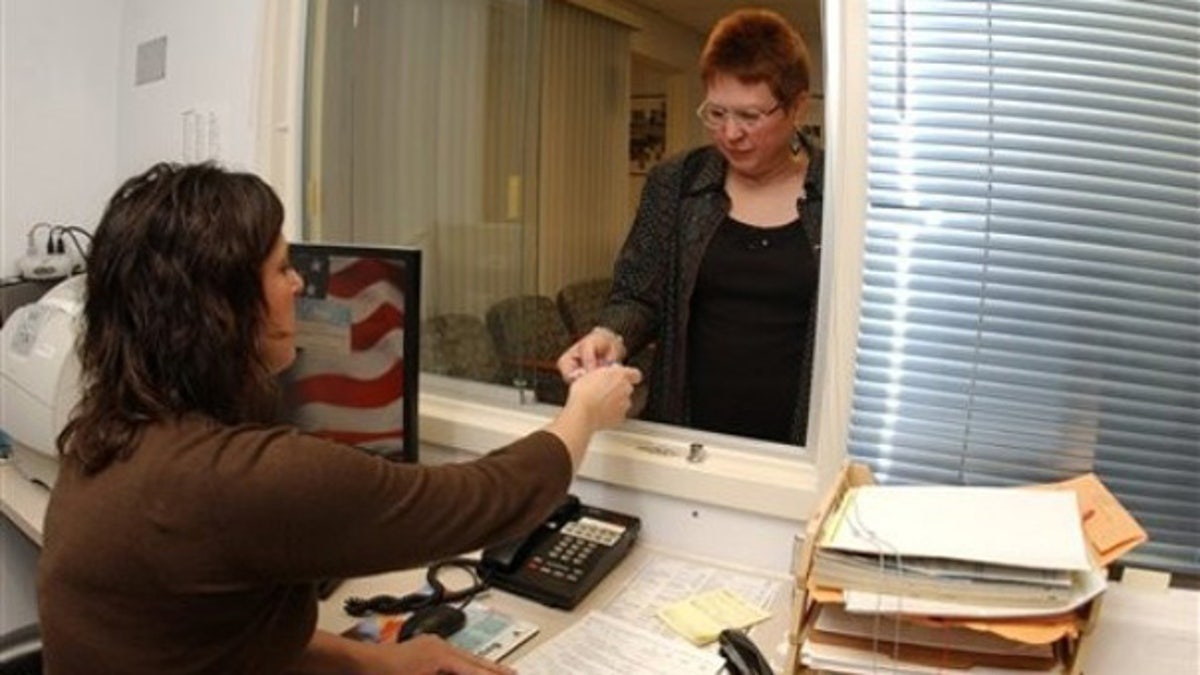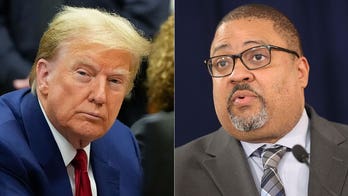
U.S. Air Force veteran Wendy Haylor, of Piedmont, W.Va., checks in with Amy Theriault, Women Veterans Program Manager at the Women Veterans Health Clinic Friday, Nov. 13, 2009, at the Veterans Affairs Medical Center in Martinsburg, W. Va. (AP Photo/Ron Agnir)
Democrats are trying to hold down Republican gains in this November's elections by hitting them where it hurts -- questioning their loyalty to the nation's veterans.
Though taxes, spending and the economic slump have been the dominant themes this election year, several Republicans have riffed on the small-government themes of the Tea Party movement by suggesting veterans be allowed to seek a portion of their medical care through the private system. In some case, they've hinted at it; in others, they've outright proposed it.
And while Democrats have been reluctant to campaign on their sweeping health care overhaul, which will eventually provide millions in government subsidies, they've been more eager to slam any Republican as heartless and irresponsible for proposing plans to "privatize" the veterans health system -- if not the Department of Veterans Affairs altogether.
The issue has emerged front-and-center in the 17th Congressional District race in Texas, where Rep. Chet Edwards, a Democrat, is battling Republican challenger Bill Flores.
Edwards is hammering Flores over a comment he made during a debate in January in which he said veterans would be "much better off" if they could see doctors in the private system and then have the government pay for it.
"Typically the care in the private sector is better than the government sector," Flores said. "So they need to go into the private system."
Flores stands by his proposal. His website explains that under his plan, veterans would have a choice. The campaign said the private option could be useful for veterans who don't live near a VA facility.
But in August Edwards convened a press conference with local Texas veterans where he called Flores' idea a "radical and dangerous plan that would destroy the VA health care system as we know it."
The dispute is also being aired out in a series of ads by Edwards, including one in which Gen. Paul Funk, the former Fort Hood commander, says Flores' plan to "privatize" veterans' care "would hurt our nation's veterans badly."
Edwards also had another ad that citing the Disabled American Veterans -- an advocacy group that claims the private sector would not want ill and disabled veterans, and that lawmakers should concentrate instead on improving the VA medical system.
In response, Flores has pulled out a bigger military figure -- Arizona Sen. John McCain, a former prisoner of war in Vietnam -- to vouch for him. McCain, in an ad, called Flores a "patriotic American who's proven he's devoted to taking care of our veterans." He said Flores' proposal mirrored his.
In Delaware, Democratic Senate nominee Chris Coons has seized on a paraphrased section of a New York Times story from last month in which Republican Christine O'Donnell said she would make health care vouchers for veterans a priority if elected.
"Her voucher scheme would seriously undercut the health care provided to our veterans," Coons said in a statement, calling it a "terrible idea."
O'Donnell's campaign held an event Friday in which O'Donnell laid out her plan for veterans health benefits.
The Veterans Affairs Department budget in 2010 was $114 billion, with about $58 billion going to mandatory benefits and about $47 billion going to medical programs. President Obama touted legislation in October 2009 announcing that the VA budget had increased by its highest amount in 30 years. The 2011 budget request is for $125 billion.
Lawmakers have long complained about backlogs in the treatment of veterans at the VA hospitals as well as conditions at several vets hospitals. Most recently, the VA sent letters to 1,800 veterans warning them of possible exposure to HIV during dental work at a St. Louis-area hospital.
Despite calls for reforms on several fronts, in the face of criticism from their Democratic opponents, some GOP candidates have eased off their initial ideas for changing the system.
Nevada Senate GOP nominee Sharron Angle suggested in a May radio interview that Veterans Affairs edge toward a private program. In the interview, she explained how her father was paying hundreds every month on prescription drugs that he couldn't get through the VA. Asked if the government should cover those things, she said: "No, not if you're working toward a privatized system."
Senate Majority Leader Harry Reid has since made that a centerpiece in his campaign's effort to cast Angle as the "extreme "candidate.
He and his aides hammered Angle for months on the comment, and in an ad last month the Reid campaign accused Angle of wanting to "end the VA as we know it."
After steering away from the issue, Angle's campaign directly responded to Reid's ad, calling it "desperate and dishonest."
"Never has Sharron Angle called for privatizing Veterans Affairs and never has Sharron called for the end of Veterans Affairs," the campaign said.
A similar flap popped up in the Colorado Senate race between Tea Party favorite Ken Buck and incumbent Democratic Sen. Michael Bennet. The liberal website ThinkProgress last month released a video clip of Buck saying a private sector veterans hospital would "be better run" than a public one. In the same clip, he noted that the funding for that would "have to come from the public sector and not from the injured veteran's pocket."
Bennet subsequently pulled together a group of Colorado veterans to defend the current system.
But Buck spokesman Owen Loftus told FoxNews.com Thursday that Buck "does not want to privatize veterans' health care."
Loftus would not comment on what specific changes to the system Buck might consider, but said the GOP nominee just wants to look at "everything" to see how it can be improved.
"He does want to make it better for veterans. They should not have to wait in long lines," he said.




